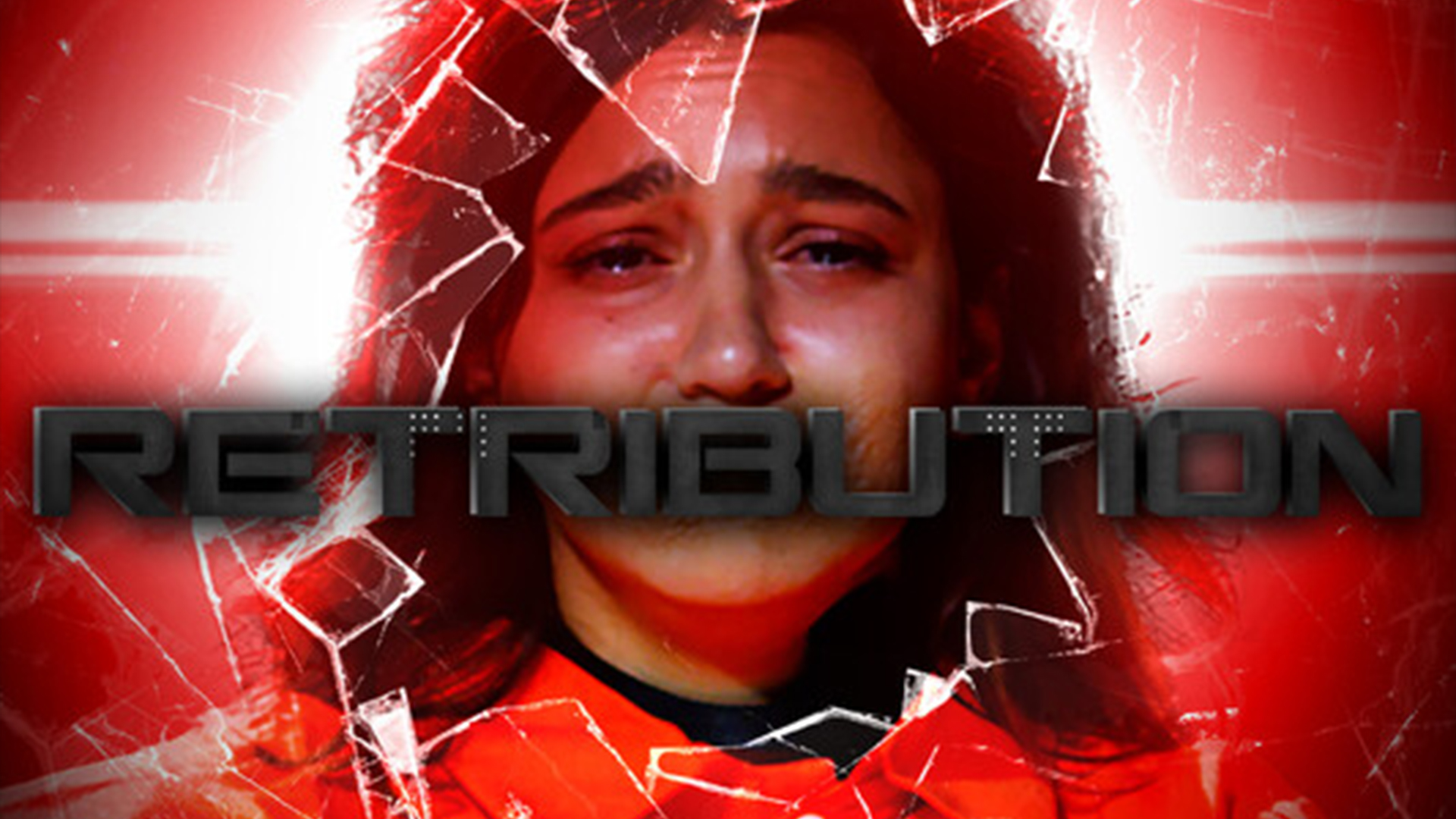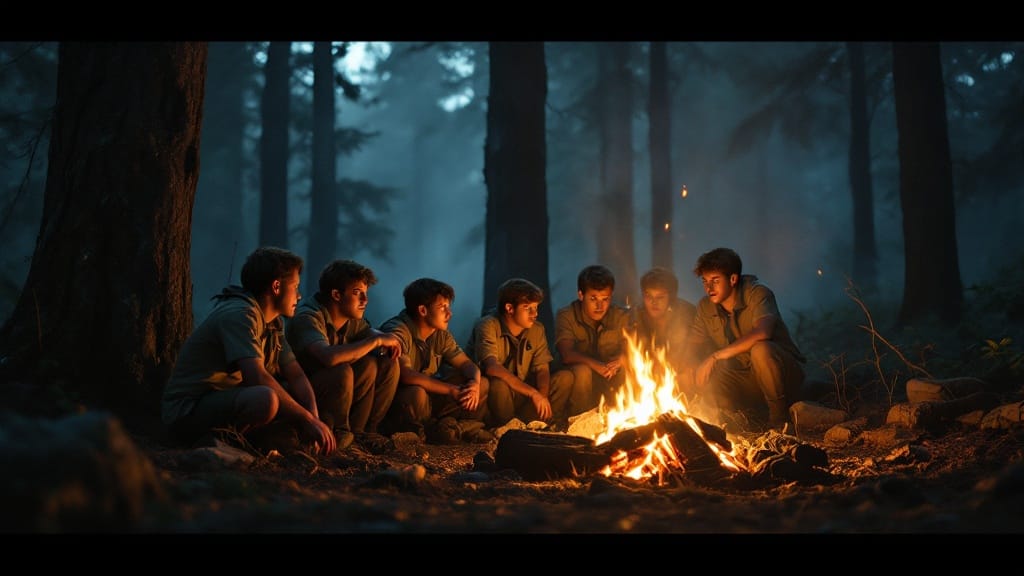Drama
Retribution

Directed by Brock Eastwood
Warning – This review contains spoilers
My popcorn was all buttered up and I was set to check out Brock Eastwood’s Retribution when I found myself drawn into its intriguing dystopian premise. Set in a future world where therapeutic treatments are disguised as punishments for society’s criminals, the film tackles some big questions about morality, memory, and the consequences of an authoritarian system. The story centers around Nicholas (played by Dane Keckley), a young man seeking redemption or perhaps simply closure after a traumatic experience. He undergoes a novel “treatment” at a futuristic clinic, hoping to address the guilt and pain from losing someone he loved, only to discover that the process has darker implications.
One of the strengths of Retribution lies in the way it gradually reveals its world. At first, I wasn’t quite sure where the story was headed, but small details hinted at the dystopian nature of the society. The AI-enforced curfews, the rigid controls, and the dehumanizing clinical treatment all come together to paint a picture of a future that feels both frighteningly real and disorienting. The concept reminded me of films like Eternal Sunshine of the Spotless Mind and 1984, especially in how it explores memory manipulation as a form of control. The comparison to Logan’s Run is also apt, given the film’s themes of life, death, and rebellion against a system that punishes those who step out of line.
Technically, the film had a few highs and lows. The cinematography, particularly in the outdoor scenes, was beautifully shot. There’s a sunset transition that felt genuinely poetic, adding a layer of emotional depth to the moment between Nicholas and Merin (Avery Pizzuto). However, the lighting in some interior scenes felt overexposed, making certain moments feel too harsh for the emotional weight they were trying to carry. Sound design was mostly solid, though I did notice some unclear dialogue in the opening scene, which could have benefited from a cleaner mix. Despite these minor issues, I thought the editing in key moments, especially the reveal of Nicholas’ memories, worked really well. The timing of these cuts built tension effectively, particularly as the film reached its emotional climax.
What fascinated me most about Retribution was its exploration of grief and memory. Nicholas is clearly haunted by the death of Merin, and the clinic offers him a chance to relive, if not alter, those painful memories. There’s something inherently tragic about a world where even our most intimate memories can be subject to manipulation. The twist near the end caught me off guard, although in hindsight, it felt inevitable. That unanswered mystery left me unsettled in a good way. It’s the kind of ambiguity that prompts further reflection.
I did feel the film could have been clearer in its world-building. Some of the dystopian elements, like why Merin died while Nicholas survived or the exact nature of the clinic’s purpose, weren’t fully fleshed out. These gaps in the narrative left me feeling slightly adrift, especially toward the end when the lines between reality and memory blur completely. The ending, while effective in its jarring nature, raised more questions than it answered. Why did Merin ultimately turn on Nicholas? Was it part of the “treatment” or something deeper within their relationship that we missed? These ambiguities could be intentional, but I found myself wishing for just a bit more clarity.
That said, I think audiences will appreciate Retribution for its ambitious storytelling and the questions it raises about memory, justice, and personal responsibility. The performances, particularly from Keckley and Pizzuto, were strong, with both actors delivering emotional depth in scenes that required subtlety. I also found the production design impressive, especially the use of minimalist, sterile environments in the clinic scenes, which heightened the cold, clinical feel of the dystopian world.
Retribution is a thought-provoking short film that, despite some narrative hiccups, offers a compelling look at how we process grief and guilt in a society that seeks to control even our memories. Fans of dystopian sci-fi and psychological thrillers will likely find much to enjoy here, especially in its exploration of love, loss, and the dangers of a system that prioritizes punishment over healing. It left me with a lot to think about—and in my book, that’s always a sign of a film that succeeds in leaving a lasting impact.
Comedy
Troop 458

WARNING! This review contains SPOILERS!
Troop 458, written by Trevor Allen, captures the often daunting, yet transformative, experience of being the new kid in a world full of unknowns. We follow Sidney, an anxious boy thrown into his first Boy Scouts campout, where he faces both the perils of acceptance and the strangeness of his eccentric scout leader. As spooky campfire tales start to weave into reality, Sidney is forced to confront his fears head-on, finding moments of humor, adventure, and unexpected camaraderie along the way.
I like the concept of Troop 458 because it blends coming-of-age themes with a playful sense of adventure, all wrapped in an atmosphere tinged with just the right amount of mystery. Allen’s writing brings to life a cast of memorable characters, especially through Sidney’s journey of growth. The tension between humor and fear feels authentic to the Boy Scouts’ setting, and it captures the real challenges kids face when trying to fit in.
What resonated with me most was the screenplay’s exploration of courage—not just in facing mythical dangers but in embracing who you are, quirks and all. Some aspects could benefit from a clearer focus on character motivations and tighter pacing to keep the momentum strong, particularly during scenes that blur the line between myth and reality.
The dialogue is great in many places, offering humor that feels natural for a group of young scouts. There were moments where I felt the conversations could be a bit sharper or more distinct to heighten the comedic or emotional impact. Character development is a strong suit, with Sidney’s evolution being both relatable and satisfying, but secondary characters could have a bit more depth to elevate the ensemble.
Allen’s Troop 458 is polished, with solid grammar, spelling, and formatting that adhere to professional standards. The structure is clean and makes for an easy read, setting up scenes that are visually compelling.
Troop 458 delivers an enjoyable mix of humor, heart, and a touch of the supernatural, leaving me eager to see how it might come to life on screen.
Drama
Ellie

WARNING! This review contains SPOILERS!
Directed by Marcus Mejia
Ellie is a refreshing experience that pulled me right into the world of a young, shy man navigating a work meeting while secretly yearning for a bit of magic in his everyday life. We’re taken through his imaginative, musical daydream—a beautiful escape from reality that reveals his true desires. I loved how the film peeled back layers of his personality without a single word of dialogue. Instead, the music carried the narrative, and surprisingly, it worked so well.
Marcus Mejia did an excellent job blending dramedy elements to keep the film engaging. The moments of humor and more emotional beats make the film feel well-rounded. Mejia’s choice to swap dialogue for music was a bold move, and it paid off. I could feel the character’s internal struggles and hopes as the music brought out emotions words couldn’t.
The lighting felt intimate, almost like it was giving us a window into the protagonist’s soul, and the cinematography perfectly captured the whimsical tone of his daydreams. I noticed how smoothly the editing transitioned between reality and fantasy, which made the story’s pacing feel just right. The sound design was on point, with every beat of music syncing beautifully with the character’s emotional highs and lows.
I loved when the protagonist’s daydream overlapped with reality, creating this seamless blend that felt so relatable. I admired how it portrayed the quiet, unspoken dreams we all carry. It was a reminder of the power of our inner worlds and how much magic lies just beneath the surface of our everyday lives.
Ellie left a gentle yet lasting impression. It’s a unique, heartfelt short film that shows how creative risks can pay off. Ellie is a memorable journey that’s definitely worth the watch.
Drama
Finding Acceptance

Directed by Andrew DeBennett
WARNING! This review contains spoilers.
Watching “Finding Acceptance” was an experience that brought me back to those anti-bullying films we’d see in school assemblies. The story follows Mary, a new student in a wheelchair, navigating the often-tough world of school friendships. Initially, she faces teasing from her peers but finds a genuine friend in Liz, who even manages to extend kindness to Mary’s bully, Max. The message is straightforward and clear: acceptance and empathy matter.
I could see what the director was aiming for—Andrew DeBennett notes that the film was both a joy to create and a personal project. The heart of the story shines through, with Kaylah Pollock (Mary) and Laney Hansen (Liz) bringing warmth to their roles. Their connection feels genuine, even if the overall story feels a bit too familiar.
Technically, the film could have used some fine-tuning. The sound mix was rough, with the music often drowning out dialogue. The editing also felt choppy, making it harder to stay immersed in the story. The dialogue leaned into clichés—phrases like “loser” felt outdated and took away from the realism. The cinematography, however, was a bright spot, creating a warm, inviting feel that suited the film’s positive message.
I felt like the story could’ve benefited from more depth. The bullying that Mary faces is minimal, making her eventual friendships feel somewhat predictable. For younger audiences, this simplicity might be engaging and easy to digest, but it misses the chance to delve into the more complex aspects of acceptance.
In the end, “Finding Acceptance” delivers a positive, albeit simple, message. While it didn’t connect with me on a deeper level, I can see it being a useful film for educational settings, especially for younger viewers learning about kindness and friendship.












